The world’s biggest record labels are teaming up to take two prominent AI music-making companies to court, a move that comes as generative artificial intelligence continues to infiltrate the music industry.
Universal Music Group, Sony Music Entertainment and Warner Music Group, among others, filed lawsuits Monday against Suno and Udio-maker Uncharted Labs, both of which recently released AI programs that enable users to generate songs from text prompts.
The proliferation of accessible AI tools capable of generating realistic music, including full songs using AI versions of real artists’ voices, has triggered a slew of legal and ethical questions for the music industry. Many artists have expressed concern over how generative AI technologies could undermine human work and compensation.
Coordinated by the Recording Industry Association of America, the music recording industry’s largest trade organization, the lawsuits were filed in U.S. federal courts for the District of Massachusetts and the Southern District of New York.
“The music community has embraced AI and we are already partnering and collaborating with responsible developers to build sustainable AI tools centered on human creativity that put artists and songwriters in charge,” RIAA Chairman and CEO Mitch Glazier said in a statement. “But we can only succeed if developers are willing to work together with us.”
“Unlicensed services like Suno and Udio that claim it’s ‘fair’ to copy an artist’s life’s work and exploit it for their own profit without consent or pay set back the promise of genuinely innovative AI for us all,” he added.
The music labels allege in the lawsuits that building services Suno or Udio requires “copying decades worth of the world’s most popular sound recordings” in order to train their models, and that both AI companies have been “deliberately evasive” about what exactly they used.
But it’s “obvious” what their music generators were trained on, according to the lawsuits. Their models could only succeed in producing such realistic songs, the suits stated, if they had been trained on “vast quantities of sound recordings from artists across every genre, style, and era” — many of which remain copyrighted by these record labels.
Neither Suno nor Udio has publicly disclosed its training data. Both charge tiered monthly membership fees for those who wish to use their AI music generators at higher capacity.
When asked for comment, Udio directed NBC News to a blog post stating that the company is “completely uninterested in reproducing content in our training set, and in fact, have implemented and continue to refine state-of-the-art filters to ensure our model does not reproduce copyrighted works or artists’ voices.”
“We stand behind our technology and believe that generative AI will become a mainstay of modern society,” Udio wrote, adding that nearly every past technological advancement in music has been met with apprehension before eventually being accepted in, and bringing greater profit to, the industry.
AI music programs have already made waves in the music industry, sometimes unintentionally. “BBL Drizzy,” a viral diss track released last month by record producer Metro Boomin, was reportedly created using Udio, though the producer was evidently unaware of that when creating the track.
Monday’s lawsuits follow a series of similar legal disputes over the use of AI in music, which has crept into everything from parody songs to music videos. A few months ago, Drake took down a diss track that appeared to use AI to mimic Tupac’s voice. The late rapper’s estate threatened to sue him over it.
Just last month, Sony Music Group — which owns well-known labels such as Columbia Records, RCA Records and Epic Records — issued letters warning hundreds of companies not to train AI models on its content without permission.
And last year, Universal Music Group and other music publishers, including Concord and ABKCO, filed a lawsuit against the AI startup Anthropic over its models’ alleged “systematic and widespread infringement” of their copyrighted song lyrics.
Now, the music labels suing Suno and Udio are seeking declarations that these services did infringe their copyrighted sound recordings, injunctions barring the services from doing so in the future, as well as damages for any infringements that have already occurred.
“Suno and Udio are attempting to hide the full scope of their infringement rather than putting their services on a sound and lawful footing,” RIAA Chief Legal Officer Ken Doroshow said in a statement. “These lawsuits are necessary to reinforce the most basic rules of the road for the responsible, ethical, and lawful development of generative AI systems and to bring Suno’s and Udio’s blatant infringement to an end.

